RANGOON — In recent times, general elections in Myanmar have been cursed. The results of the 1990 election were annulled by the previous military regime after the main opposition party, the National League for Democracy (NLD), won in a landslide.
The following national election held in 2010 was rigged to favor the military-backed Union Solidarity and Development Party (USDP), with reports of widespread voting irregularities.
Both elections failed to usher in the much-needed democratic reforms yearned for by the vast majority of Myanmar citizens.
Whether or not the upcoming national election on November 8 will be similarly blighted is still a burning question among Myanmar voters amid their collective electoral trauma.
But major impediments to holding a free, fair and credible vote remain, not least of which is the country’s military-drafted 2008 Constitution.
Article 59(f) of the Constitution bars popular opposition leader Daw Aung San Suu Kyi from becoming president, regardless of the electoral outcome in November. The charter also reserves 25 percent of parliamentary seats for military appointees, effectively providing them with a veto over major amendments to the Constitution—which require a 75 percent majority of parliamentary votes.
The military’s political role is further cemented by a constitutional provision mandating that the ministers of Defense, Home Affairs and Border Affairs, be army appointees.
Furthermore, the Union Election Commission (UEC), tasked with organizing and overseeing the nationwide poll, is chaired by a former military general who is also a former lawmaker with the ruling USDP.
But despite these undemocratic restrictions, the expectation of a transparent electoral process lingers on for Myanmar people.
One positive of recent times was the handling of the 2012 by-election, broadly considered to be a credible poll, in which the NLD won 43 of the 44 constituencies it contested. The ruling USDP claimed a solitary seat of the 45 constituencies on offer.
However critics contended that President U Thein Sein’s government had needed to hold a fair poll, which saw Daw Aung San Suu Kyi win a seat in the legislature, in order to convince skeptics, at home and abroad, that the reform process was genuine.
Nevertheless, the by-election was one small but encouraging step in the country’s slow-burning transition to democracy and likely encouraged many political parties to contest the 2015 national election.
The 2012 result was also clear proof of the wide support for Daw Aung San Suu Kyi and the NLD—a serious concern for the ruling party. If this year’s election is similarly credible, the NLD and other pro-democracy parties are likely to perform strongly.
With greater numbers in Parliament, the NLD and other ethnic political parties will be able to push for legislative changes that benefit Myanmar’s citizens.
It remains difficult, however, to foresee radical changes, particularly to the Constitution, considering the ongoing presence of a military bloc in Parliament. The main, self-ascribed duty of these unelected MPs is to defend the 2008 charter recently described by The Economist as an “army-drafted monstrosity.”
With a more diverse Union Parliament expected following the election, the military is perhaps even more unlikely to relinquish its political foothold. Any return to the barracks would take time.
Thus, the post-election period will be as delicate as it will be crucial. If the democratic opposition and ethnic parties win a parliamentary majority, all eyes will turn to the USDP and the military as to whether they accept the result.
Myanmar people don’t want to relive the bitter experience of the 1990 election.
Even with a new government formed in 2016, a genuine dialogue between key political and military leaders will be necessary to address the country’s myriad challenges.
Until now, the incumbent president U Thein Sein has shown little interest in such a dialogue. Talks held in recent months between the president, the army chief, parliamentary speakers, an ethnic representative and Daw Aung San Suu Kyi, were merely superficial.
Like it or not, the result of the upcoming election will have a direct impact on every individual in Myanmar and on the country’s foreign relations.
The result will shape Myanmar’s future, though it may not herald the radical political shift that many have fought—and died—for.
Party Lines: Between Hope and Realism
The Irrawaddy’s San Yamin Aung speaks with representatives of five political parties about their hopes and plans for the polls.
NATIONAL LEAGUE FOR DEMOCRACY (NLD)
DAW NAN KHIN HTWE MYINT, Central Executive Committee member
Founded in 1988, Myanmar’s largest opposition party led by Daw Aung San Suu Kyi won more than 80 percent of seats in the 1990 general election—the results of which were annulled by the ruling junta. The NLD boycotted the country’s last general election in 2010 but participated in 2012 by-elections, winning 43 of the 44 seats it contested.
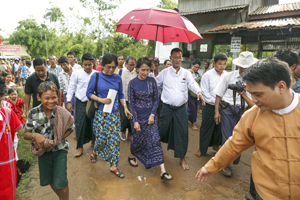
EXPECTATIONS
“Everyone wants real change from the 2015 election. To achieve that, I think we all need to support one large democratic force. I hope pro-democracy forces will win in the coming election.”
CHALLENGES
“We have found many errors in the voter lists. Even my name didn’t appear in the voter list in my constituency. And in some places, the collaboration between the sub-election commissions is weak. As with widespread cheating with advance votes in past elections, it is a risk for us if half of the voter lists include the wrong data.”
STRATEGY
“We have been carrying out our voter list verification process including door-to-door visits to voters. We will also pressure the Union Election Commission on gaining access for party representatives to polling stations.”
ON THE MILITARY
“If they regard the public as their parents, as they say, they should only fulfill a defense role for the country. There is no way they will reduce their allotment of 25 percent of seats in Parliament [in the near future].”
UNION SOLIDARITY AND DEVELOPMENT PARTY (USDP)
U TIN MAUNG OO, Central committee member
Formed in 2010 as the political arm of the former military regime, the USDP won a parliamentary majority in that year’s widely discredited general election. The USDP will contest constituencies nationwide in the coming election, with Union Parliament Speaker U Shwe Mann heading the party’s Elections Winning Committee.
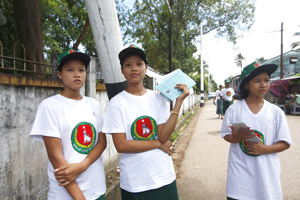
EXPECTATIONS
“The Union Election Commission has released preliminary eligible voter lists and is fixing the flaws. Each party is trying to win and some may merge or form alliances. New parties have also been founded. So this year’s election will be the [most] significant election in the country’s history.
“People’s experiences from 2010 and 2012 are different. In 2010, the public had less interest in political parties. Now the quality of party members, lawmakers and politicians’ has increased to some extent. As a consequence, no party will win a landslide victory. It is also more likely that ethnic parties will win in their ethnic states.”
CHALLENGES
“Some parties are speaking about constitutional amendments. The main thing in a democracy is to follow the existing rules. The most important thing is the country’s stability. Politicians generally use either students, workers or farmers [for political ends]. If some parties or groups use them for their benefit, it won’t be good for the country.
“There are many people who don’t have a national registration card. There is no specific plan [to address their eligibility to vote]. In my constituency alone, there are thousands [without national registration cards] who aren’t eligible. This is the biggest challenge for the election. The UEC is trying their best and I believe the election will be free and fair. But the government needs to make sure all eligible citizens are able to vote.”
STRATEGY
“After the winning party forms government, some party policies should form the policies of the executive body. At present, unfortunately, the USDP’s policies aren’t working in tandem with the government’s operations.”
ON THE MILITARY
“Let’s say representatives of the 14 states and regions and the military are on the same boat heading toward democracy; they can encounter strong waves and other difficulties together on the way to their destination. If we work together, the military will know the difficulties in achieving democracy and they can help us too. But if we leave them out, they won’t know the challenges and will not be with us. The more doubts and difficulties that build up, the more potential there is for a coup like in Thailand. So for now, the 25 percent of military lawmakers should continue.”
NATIONAL DEMOCRATIC FORCE (NDF)
U KHIN MAUNG SWE, Chairman
The NDF is comprised of former leading members of the NLD who disagreed with the party’s decision to boycott Myanmar’s last general election in 2010. The NDF contested 161 seats in that poll, winning 12 seats in the Union Parliament and four seats in state and regional legislatures. The party plans to field nearly 300 candidates to contest the upcoming national election.
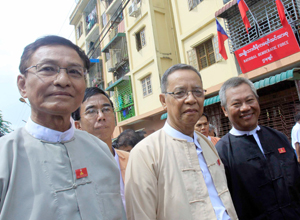
EXPECTATIONS
“More pro-democracy forces should win seats in Parliament. If so, changes in the country could happen faster. But it depends on the public’s votes. I think it is more likely there will be a coalition government. There is no way for a landslide victory by a major party.”
CHALLENGES
“Errors in the voter lists. Also we need to achieve peace in the country before the election to increase the chance of a fair poll. People may cast votes freely but there could still be manipulation by the ruling party—we need to prevent this. Officers at polling stations could also come under pressure… International watchdogs need to be present to monitor the process in as many areas as possible, even if they can’t monitor nationwide.”
STRATEGY
“The NLD and other CSOs are checking the voter lists. We will urge the government and the electoral body to fix the errors in time. That’s all we can do. We don’t have the manpower or financial resources to do it ourselves.”
ON THE MILITARY
“The role of the military in the Parliament will be the same now, with 25 percent of seats. They may consider voluntarily reducing the number of seats themselves if there was a guarantee of peace before the election. If not, there is no way they would [take this step].”
ARAKAN NATIONAL PARTY (ANP)
U AYE THAR AUNG, Party patron
ANP formed in January 2014 following a merger between the Rakhine National Development Party (RNDP) and the Arakan League for Democracy (ALD). The former party won 35 of 44 seats it contested in the 2010 election, which the ALD boycotted. The party plans to contest 63 seats in the coming election, mainly in the regional Rakhine State legislature.
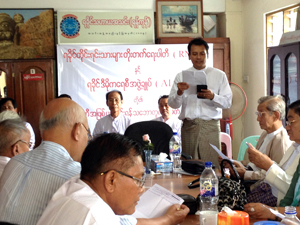
EXPECTATIONS
“I place more emphasis on amending the 2008 Constitution than on the 2015 election. Without major changes to the Constitution, I don’t believe there will be changes in the country and internal peace beyond the election. But if candidates from the NLD and ethnic parties win most of the seats in Parliament, we could have more power to make legislation. And the same in regions, if ethnic candidates win in their constituencies and become lawmakers and ministers, I hope they will work for the development of their regions. But we can’t expect a real transition since major articles in the Constitution are still not amended.”
CHALLENGES
“There were voting irregularities in the 2010 election. I am concerned there will be the same in the 2015 election. It is hard to believe that from 30 to 80 percent of the current voter lists are [inaccurate]. I am also concerned that if the NLD and ethnic parties win a landslide victory, the ruling party won’t transfer power and [acknowledge] the new Parliament.”
STRATEGY
“Our party only represents one state. So I think to monitor the [broader] challenges, the government and big parties will be vital.”
ON THE MILITARY
“After the election, 25 percent of seats will still be reserved for military appointees’ in the Lower House, Upper House and the regional parliaments. This is the main barrier to changes in the country and I don’t see that they will easily quit by themselves.”
SHAN NATIONALITIES LEAGUE FOR DEMOCRACY (SNLD)
U SAI LEIK, Joint-secretary
The SNLD won 23 seats in the annulled 1990 election. It was forcibly disbanded after boycotting the 2010 poll but re-registered in 2012 and plans to contest more than 160 seats in the coming national election.
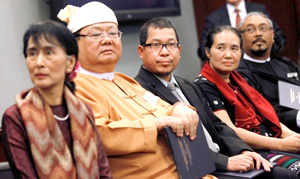
EXPECTATIONS
“If democratic forces win most seats in the election, we will have hope for constitutional amendments. To have the federal union that ethnics demand and the democracy that the public wants, the main challenge is to change the Constitution.
“I think this year’s election is more important than the 2010 election because at that time some parties were excluded and there were many parties, especially ethnic parties, that didn’t run for various reasons. But in the 2015 election, I hope almost all ethnic parties will run.
“If the military keeps its seats in Parliament, it won’t be a good look internationally. It is important that the democratic forces win a landslide. Only with that can we achieve political dialogue and change the Constitution.”
CHALLENGES
“I’m not sure that the election will be free and fair. Even in the preliminary voter lists, there are lots of errors. Although the electoral body is saying they will fix all the errors in time, we can’t predict what will happen.
“And the government needs to guarantee they will recognize and implement the results of the election. The ruling party needs to contest the election fairly. I am concerned about that; the attention of the international community, media and public is much needed.”
STRATEGY
“We are doing voter education, verifying voter lists to correct errors and are raising awareness among all eligible voters to come to the polling stations and cast votes.
“And we will watch the ruling USDP in accordance with the code of conduct. If they violate it, we will publicly expose them in collaboration with NGOs and the media.”
ON THE MILITARY
“Until now, they haven’t looked likely to reduce their current 25 percent of seats in Parliament. But I think if the democratic forces and ethnic parties could pledge not to pursue action over past incidents, they may eventually reduce [their representation].”
This article was originally published as the cover story of the August 2015 issue of The Irrawaddy magazine.

















